The beginning of the video quotes Isaiah 6:8:
8Also I heard the voice of the Lord, saying, Whom shall I send, and who will go for us? Then said I, Here am I; send me.
This is the essence of a volunteer. When called upon, they raise a hand and pledge to provide service, often without knowing the full extent of what will be asked of them; not knowing what sacrifices, big or small, may be required. They may not even understand the full intent of the mission, yet they sign up and they go.
As I was searching for the above passage, I read the entire chapter 6 of the book of Isaiah and realized that it is a testament to what it means to be a soldier.
1In the year that king Uzziah died I saw also the LORD sitting upon a throne, high and lifted up, and his train filled the temple.
2Above it stood the seraphims: each one had six wings; with twain he covered his face, and with twain he covered his feet, and with twain he did fly.
3And one cried unto another, and said, Holy, holy, holy, is the LORD of hosts: the whole earth is full of his glory.
4And the posts of the door moved at the voice of him that cried, and the house was filled with smoke.
Isaiah begins by talking about being lost and looking for something, for a place, for a cause. It is the end of an era and Isaiah is looking for a new beginning, a new mission. This is Isaiah receiving the calling.
For many of our men and women in the armed forces, this is how they start out. Not that they all receive a "calling" from angels on high, but many are just out of highschool or college, the ending of an era for them, looking for something to do with their lives. Some see the recruiters or others in the military squared away and confident and want to achieve that for themselves. Some see it as a step on a ladder to improving their lives, whether through college or skill sets that they might not be able to afford to learn or be considered for outside of the military. Maybe it's financial security when they have come from a place or family where they have never experienced it or are in a situation where they need it. Still others believe in service, in giving back for what they have received from our nation or because they have been raised to believe that selfless service is the height, the best of humanity.
Some would believe that most of the reasons I noted above represent "reluctant" volunteers; people who have no where else to go and nothing else to do. In this country where unemployment is around 5% (give or take a few decimal points), where there is welfare, medical assistance and job training offered in the civilian field, where student loans and college education is achieved by an ever increasing percentage of our population, this definition of people's service is simply unexceptable. People may not know everything that they will go through in the military or have to do when they join, but it is not a blind decision. It is not as if anyone can join the military, particularly today, and believe that they are joining some "New Deal" job corps only to find out they might or will go to war. It is simply an impossible supposition.
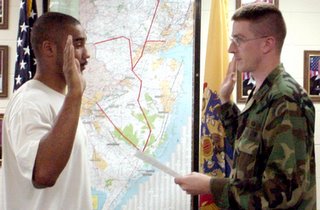 So, what does that leave us with as an explanation of why people serve; the final reason above others? One can certainly be poverty stricken and not feel the need to don a uniform. When signing up for the military, there is a specific process, a lot of paperwork, background checks, medical checks and the final swearing in before anyone even begins the basic training that turns them into soldiers. Some even talk to the recruiters for days and weeks before making the final decision. In the end, when someone does make that final decision, all of the other reasons they may have entertained as the original reason for joining, take the back burner. At this point, they either "receive the calling" to become a soldier, sailor, air man or marine, or they don't. There are certainly some that "receive the calling" that may regret answering it later, but for the most part, these volunteers not only answer the calling, but provide excellent service.
So, what does that leave us with as an explanation of why people serve; the final reason above others? One can certainly be poverty stricken and not feel the need to don a uniform. When signing up for the military, there is a specific process, a lot of paperwork, background checks, medical checks and the final swearing in before anyone even begins the basic training that turns them into soldiers. Some even talk to the recruiters for days and weeks before making the final decision. In the end, when someone does make that final decision, all of the other reasons they may have entertained as the original reason for joining, take the back burner. At this point, they either "receive the calling" to become a soldier, sailor, air man or marine, or they don't. There are certainly some that "receive the calling" that may regret answering it later, but for the most part, these volunteers not only answer the calling, but provide excellent service.This is the calling.
5Then said I, Woe is me! for I am undone; because I am a man of unclean lips, and I dwell in the midst of a people of unclean lips: for mine eyes have seen the King, the LORD of hosts.
Here Isaiah realizes that he is being called by a higher power and that the expectations of this calling, as represented by "the King", is a perfection he has never experienced before and believes that he can never attain. He is a common man and comes from common people.
This is a representation of most of the men and women serving in our armed forces. They come from us, from among our citizens. Most were never "perfect". They have all of our proclivities and emotions; the good and the bad. When they go to serve, they are often nervous about whether they can handle it because it is different and it requires a different attitude and actions. Yet, for all of the training that they are subject to, it cannot change basic human behavior, though these men and women may strive and achieve the ability to control them or act through them, even in crisis, due to the training they receive. It does not make them devoid of emotion or zombies, nor perfect, just better trained, organized and possibly more confident in reaching for that goal.
This is the imperfection before the purification.
But even Isaiah cannot begin this perfection without purification:
6Then flew one of the seraphims unto me, having a live coal in his hand, which he had taken with the tongs from off the altar:
7And he laid it upon my mouth, and said, Lo, this hath touched thy lips; and thine iniquity is taken away, and thy sin purged.
In most cultures, "fire" is used in purification rites. Whether it is the Indian Guru who walks on hot coals to enhance his ability to meditate and ignore outside forces or an American Indian who may use a sweat lodge to sweat out impurities and receive a "vision" to guide them towards the future or even more ancient cultures that practiced rites such as jumping over bon fires because they believed that their own "demons" would be unable to follow them. All of these and more represent fire as a purification of the mind and body.
In a more literal sense, fire has been used since ancient times to smelt metals, such as iron ore, in order to create strong alloys for weapons, armor or even gates of fortified positions (just to name a few). Steel itself is a delicate balance between the right combination of ores, heat and cooling. If it isn't done properly, the steel can become brittle and break from the slightest touch.
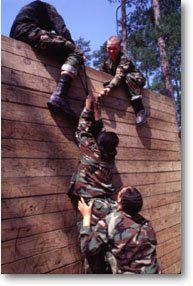 Basic training and technical schools in the military provide this "tempering" of soldiers. The military has developed training programs over the years in order to better develop this tempering process. It can and will fail on occasion. Sometimes that failure of the steel is quickly apparent and other times it may not appear until the soldier's steel has been employed as it is intended. We know, though, for the most part, this training works. We know because our large military functions everyday under the most stressful conditions and sometimes in peace time as well. We know because an undesciplined, untrained force would not make it to Baghdad in a day rush and taken the city. We know because, over four years into Afghanistan and three in Iraq, under difficult, strenuous and stressful conditions, our military continues to go out on hundreds of civil affairs patrols, guard streets, track down insurgents and change the faces of these nations, employing the very tempering techniques they have learned. Without overstating the facts, we know that our men and women exercise a definite control over their actions, their ability to destroy and build because they suffer attacks every day and there are no daily reports of civilian non-combatants being killed by our men and women. Instead, they work through the attacks, caring for the dead and wounded, civilian and soldier alike as well as the enemy sometimes.
Basic training and technical schools in the military provide this "tempering" of soldiers. The military has developed training programs over the years in order to better develop this tempering process. It can and will fail on occasion. Sometimes that failure of the steel is quickly apparent and other times it may not appear until the soldier's steel has been employed as it is intended. We know, though, for the most part, this training works. We know because our large military functions everyday under the most stressful conditions and sometimes in peace time as well. We know because an undesciplined, untrained force would not make it to Baghdad in a day rush and taken the city. We know because, over four years into Afghanistan and three in Iraq, under difficult, strenuous and stressful conditions, our military continues to go out on hundreds of civil affairs patrols, guard streets, track down insurgents and change the faces of these nations, employing the very tempering techniques they have learned. Without overstating the facts, we know that our men and women exercise a definite control over their actions, their ability to destroy and build because they suffer attacks every day and there are no daily reports of civilian non-combatants being killed by our men and women. Instead, they work through the attacks, caring for the dead and wounded, civilian and soldier alike as well as the enemy sometimes.This process begins the minute they take the oath and never really ends, but, by the end of training, the "live coal" from "the altar" of service has been placed upon their lips and you know it by the sound of, "hooah!" they echo in unison. The past is burned away by their trials.
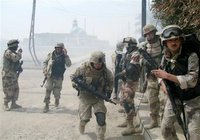 In war, this tempering process is more intense and continues to purify the steel that each man and woman is made of. Again, the process usually leads to the strengthening of mind and body that many of us can never fully understand. Some come through the fire and become leaders. Still, there are some that become brittle and break. We cannot forget that, in a time of war, the trials we place them through are more than we ask ourselves on any given day; for most of us, we go our whole lives without knowing this firey process and we should thank the powers that be and these soldiers that it isn't asked of us lest we find our own imperfections, become brittle and break.
In war, this tempering process is more intense and continues to purify the steel that each man and woman is made of. Again, the process usually leads to the strengthening of mind and body that many of us can never fully understand. Some come through the fire and become leaders. Still, there are some that become brittle and break. We cannot forget that, in a time of war, the trials we place them through are more than we ask ourselves on any given day; for most of us, we go our whole lives without knowing this firey process and we should thank the powers that be and these soldiers that it isn't asked of us lest we find our own imperfections, become brittle and break.This is the fire that tempers and purifies.
8Also I heard the voice of the Lord, saying, Whom shall I send, and who will go for us? Then said I, Here am I; send me.
Here, the calling is received. What the mission is, Isaiah does not know, but he raises his hand and answers the call because he believes in this higher calling, that it is important even if he knows not what will be asked of him.
That is what is asked of and delivered by our soldiers. They may not have experience being a soldier or fighting war. Those on the outside that often espouse the idea that these soldiers are "duped" into serving, don't understand that the point of receiving "the calling" isn't about knowing everything before you serve, but serving even when the mission changes or becomes difficult. There are somethings that life may never prepare them for and that even intense training cannot take the place of the "fire" they will be tested with.
This is the essence of service, to not know everything, but to raise the hand and say, "send me".
9And he said, Go, and tell this people, Hear ye indeed, but understand not; and see ye indeed, but perceive not.
10Make the heart of this people fat, and make their ears heavy, and shut their eyes; lest they see with their eyes, and hear with their ears, and understand with their heart, and convert, and be healed.
Finally, Isaiah is given his mission. His job is to spread the message. Yet, this message is not to be "heard" or "seen" in the usual way messages are sent and received because the message has already been given before, but those that have received it don't understand because it is not simply a message of logic and reasoning to be heard by the ears or understood by the mind, but is a message that must be understood with the heart.
This is the message that our men and women take with them every day into the field in Afghanistan, Iraq, Dijbouti, Ethiopia, the Phillipines, Indonesia, and the myriad of places they serve. Sometimes this message is delivered with the hand of violence, justice and retribution, defending our nation and even people's of other nations. Just as often if not more often, the service required is a presence and a vigilence to let others know they are there to defend and protect.
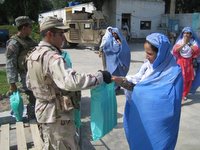 Finally, hundreds if not thousands of times a day, the service provided is the true service of delivering "the message". In all of these places and many more, such as Ecuador or Haiti or Kosovo, these men and women perform such tasks as training military forces, not just in the use of arms, but in the laws of land war, the rule of constitutional civilian government and their duties as citizens, but also building schools, repairing roads, building health clinics, building democratic institutions such as city or town councils, building civil police, building electrical and water plants and a myriad of other activities, largely unrecognized by their civilian peers.
Finally, hundreds if not thousands of times a day, the service provided is the true service of delivering "the message". In all of these places and many more, such as Ecuador or Haiti or Kosovo, these men and women perform such tasks as training military forces, not just in the use of arms, but in the laws of land war, the rule of constitutional civilian government and their duties as citizens, but also building schools, repairing roads, building health clinics, building democratic institutions such as city or town councils, building civil police, building electrical and water plants and a myriad of other activities, largely unrecognized by their civilian peers. 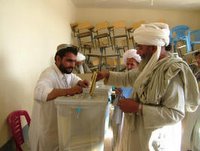 The message is the rule of law. The message is in how to treat your neighbors. The message is about "good society" or expectations of interactions between citizens. The message is how democracy, "good society" and the rule of law produces strong citizens, strong country and strong economy all backed and produced by the very freedom these men and women protect. In the words of another, these men and women are our ambassadors, for good or bad, to the rest of the world. For the most part, while this "message" can be spoken or written, while video and pictures of democratic, prosperous nations are available and seen around the world, the reality of what freedom and democracy means must sometimes be felt with the heart before it can be reasoned with the logical mind.
The message is the rule of law. The message is in how to treat your neighbors. The message is about "good society" or expectations of interactions between citizens. The message is how democracy, "good society" and the rule of law produces strong citizens, strong country and strong economy all backed and produced by the very freedom these men and women protect. In the words of another, these men and women are our ambassadors, for good or bad, to the rest of the world. For the most part, while this "message" can be spoken or written, while video and pictures of democratic, prosperous nations are available and seen around the world, the reality of what freedom and democracy means must sometimes be felt with the heart before it can be reasoned with the logical mind.In the same sense, a belief in service, adherence to duty and the honor that our men and women serve with, are not simply products of hearing and seeing, but is understood by the heart.
This is the message. Love and devotion for country, for an idea, above and beyond self. It is represented by our soldiers and is our message to the world.
11Then said I, Lord, how long? And he answered, Until the cities be wasted without inhabitant, and the houses without man, and the land be utterly desolate,
12And the LORD have removed men far away, and there be a great forsaking in the midst of the land.
This is not a message of destruction. This answer is about time. Isaiah is being told that his service will be for eternity because that is the length of the struggle and the time that it will take to deliver the message to all of the people that must hear it and understand it with their hearts. It will require a life time of service by Isaiah and even more by those that come after him.
For many men and women in our armed forces, their committment to service is a lifetime, whether they remain in service until they retire, or if they die in service and even when they leave the service, many continue on as reserves or National Guard, or continue to work for the government and our people in another capacity, or supporting the men and women of the armed froces that come after them or simply take the core values they were taught in the military and applying them to their civilian life by committing to charitable programs, teaching or volunteering.
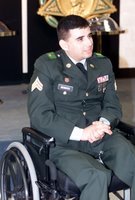 For some who have born the battle, those that have been tested and tempered by the fire, the physical and psychological effects of service indeed continue for a lifetime.
For some who have born the battle, those that have been tested and tempered by the fire, the physical and psychological effects of service indeed continue for a lifetime.Finally, this committment to service continues on to the next generation and the next, inspired by all those that have come before them and built upon their efforts to build and maintain the forces that defend our country, our democracy and our freedom.
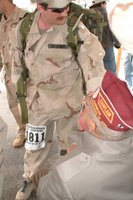 This effort may be from a supply specialist working in logistics who keeps the flow of provisions going to those in the field, whether for the men and women serving or for those occasions when humanitarian aid is needed immediately and is quickly supplied by our military for relief around the world; a specialist who develops a new process for simplifiying and speeding these provisions that is used and built upon by future generations of logistics support.
This effort may be from a supply specialist working in logistics who keeps the flow of provisions going to those in the field, whether for the men and women serving or for those occasions when humanitarian aid is needed immediately and is quickly supplied by our military for relief around the world; a specialist who develops a new process for simplifiying and speeding these provisions that is used and built upon by future generations of logistics support. This effort may be the infantry sergeant, having fought specific battles and suffered the loss of his friends and comrades, that develops new tactics or recommends new weapons or gear that helps complete future missions and protects men and women who serve now and in the future so that they may continue the mission. This effort may be the civil affairs officer who meets with the head of a tribe or governor of a province in some far off place like Dijbouti or Iraq or Afghanistan, that befriends this leader and shows him the true nature of country, our people, that will convince this man to lay down arms or assist our cause, that will save the lives of future citizens of this nation and those that may serve in the area after he has left.
This is eternal service.
13But yet in it shall be a tenth, and it shall return, and shall be eaten: as a teil tree, and as an oak, whose substance is in them, when they cast their leaves: so the holy seed shall be the substance thereof.
Isaiah is being warned that, for all his service, for all those that he reaches with the message, for all those that he tries to make "understand with the heart", only a tenth of them will receive it and understand. However, while this seems miniscule and hardly worthy of such long devotion to service, there is hope because even if only a tenth understand the message, wherever they go, whatever they do, they will be like a sturdy tree that casts its leaves to the wind, spreading the message wherever the leaf lands. Thus, Isaiah would have performed the service required of him.
For our service men and women, whether they serve for four years or twenty; from graduation to death or retirement, most will not see the fruits of their labor. They may end their direct service prior to the end of mission, they may never be deployed again or their functions here, stateside appear to have no impact on the greater world so they never know if that service was enough and, many times, think they should have or could have done more.
The battles in Iraq and Afghanistan are not over. Men and women have served and returned, some have left the service, others will never be deployed again due to position, necessity or even physical condition and still others have died, not knowing yet if their sacrifice has benefited the people and cause they were serving. In every war, from the Revolution until today, it has ever been thus. Nathan Hale died never knowing if his dream of a free country would come to fruition. His last words are recorded as, "I regret that I have but one life to give for my country". Neither did the young rifleman who fell at Bunker Hill. Neither the young African American member of the 54th Massachusetts who fell at Battery Wagner, Hilton Head, South Carolina, know if his sacrifice meant that his family would one day live free and equal with the family of the white soldier he fell beside. At the landing on Normandy, many Soldiers died or left the battle field severely wounded without ever knowing if they had paved the way for the defeat of the fascist and secured continued freedom for his country or re-instated the freedom and security of people throughout Europe; likewise the young marine on Okinawa. Later at Puson and the Chosin Resevoir, who fell that would never know whether his friends and compatriots had survived the Chinese onslaught or the terrible winter much less turning back the Communist advancement.
Even into Vietnam, where 56,000 Americans gave their lives, hundreds of thousands were wounded and over a million served and returned home. Vietnam was listed as a defeat and our men and women who served were treated as if they had dishonored their oaths of service, when so many had given all they could to the people of Vietnam and their commrades in arms. Here, the "tenth" that heard the message of freedom and democracy stood a true testament of time, when after the fall of Saigon, our men and women tried to rescue as many people as possible and even afterwards, many Vietnamese risked their lives and left everything for a chance to come to America. How did they know that this country was anything more or less than the one they were leaving? Literacy was not high so books, magazines and newspapers were out of reach, television was not as international or widely seen, yet they came here by the boat load in anything that could float, hoping to reach our ships or some port of call where they knew they would receive asylum. They knew because, whatever the outcome of that ill-fated war, our men and women representing our nation, our ideas planted the seeds.
Many Vietnam Veterans have felt that they left the job undone or left people that depended on them to the less than tender clutches of evil men. But, even in their leaving, the promise of the future was given and many continue to this day in that nation to work towards it. That is the legacy of the service of our soldiers in Vietnam.
Even today, no one knows the outcome of Iraq or Afghanistan. They may become well developed democracies, stable and capable, functioning as we do or they may be slightly different, applying other rules and developing, as they have, a slightly different representative system. Finally, these nations may not maintain their democracy and freedom. They may be undermined and finally destroyed by anarchists and Islamists intent on establishing their own kind of nation. The outcome is not certain yet, because the war is not over yet.
Many look at the service of our men and women compared to the possible outcomes and try to apply a "cost to benefit" ratio to determine if the outcome was or is worthy of all efforts. They look for tangible evidence as seen by the establishment of governments that look like ours or by the complete cessation of violence or some visible and overt surrender of the enemy. Generally, in this kind of war, we can never expect that tangible proof to exist in our life time because this message and this struggle is ongoing; whether it is against Communism, Islamists or some other totalitarian state or actors.
Even if that day comes that we are forced to leave by circumstances or the demand of our democratic government representing the people of this nation, our men and women should not feel that they failed to provide the expected service because, wherever they go, whenever they have spoken, whenever they build a school, provide medicine, constitute local governments, given a soccer ball to a small child, the ideas, the dream, the message, the seeds of freedom and democracy are being planted for future generations. A "tenth" have heard and understood. These, according to Isaiah, are "a teil tree, and as an oak, whose substance is in them, when they cast their leaves: so the holy seed shall be the substance thereof."
This is the mission.
Through it all, we know that we will survive as a nation, that freedom and democracy will thrive, that the mission will go on and the seeds will be planted as long as it is needed, so long as there are those who, even in the face of possible death and the unknowing of the outcome of the mission, raise their hands and their voices saying, "Here am I, send me."


No comments:
Post a Comment